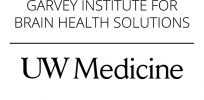Challenge
Brain disorders such as depression, anxiety, post-traumatic stress disorder, traumatic brain injury, bipolar disorder, schizophrenia, addiction, autism and Alzheimer’s disease affect nearly half the world’s population, robbing millions of individuals and their families of the opportunity to lead healthy and productive lives.
Our Approach
- We bring a dynamic community of clinicians, researchers, patients, families, communities and employers together to accelerate research and rapidly translate discoveries about brain health into prevention and treatment strategies for individuals with common brain disorders.
- We work to better detect brain health problems early on by capitalizing on advances in neurosciences, genetics, computer science, engineering, brain imaging, psychiatry, psychology, neurology and rehabilitation medicine.
- We engage patients and families in prevention and treatment programs that can substantially improve people’s lives.
University of Washington
Garvey Institute for Brain Health Solutions
Department of Psychiatry & Behavioral Sciences
1959 NE Pacific Street
Box 356560, Room BB1656
Seattle, WA 98195-6560
gibhs@uw.edu
Sign up to receive news and updates about the Garvey Institute for Brain Health Solutions!

